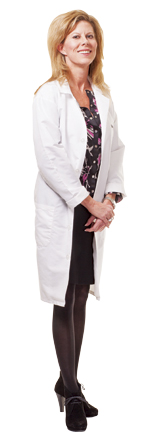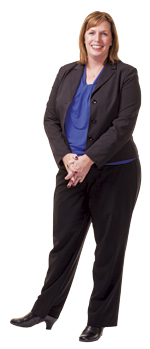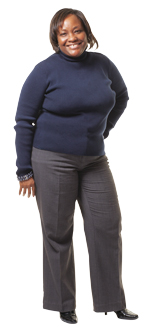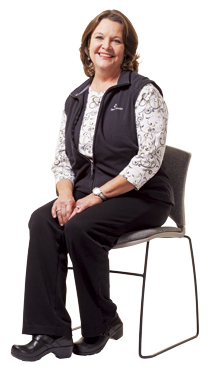509 physicians, nominated by their peers, recognized for both their professional expertise and their attention to the specific needs of female patients.
We asked a cross-section of the doctors named on this list, across a range of specialties, to tell us what excites them most about practicing medicine today, what advances lie ahead, and what single piece of advice they would offer each and every patient. We also shine a spotlight on the teams that help the best doctors do their extraordinary work—from the first phone call to schedule an appointment to the wrap-up after the office visit—through one of our Best Doctors, in her own words.
Who Decides?
FAQs about Minnesota Monthly’s Best Doctors survey
Who picks the doctors?
Their peers. In August, we sent postcards to more than 10,000 doctors in the 11-county metro area, as well as Olmsted County, based on a mailing list provided by the Minnesota Board of Medical Practice. Respondents were asked to log on to a secure website and name up to three doctors in each specialty. More than 3,000 doctors were named, but only 509 garnered enough votes to meet the threshold set by our editorial staff.
Why focus on women?
In some cases, the healthcare needs of women and men can be very different. We asked respondents to name the doctors they would recommend to female family members, friends, and loved ones.
Were male doctors excluded?
No. Respondents were instructed to name physicians who were particularly attuned to the needs of their female patients—regardless of gender.
How were the specialties selected?
The American Board of Medical Specialties recognizes 24 member boards that grant certification in specialized areas of medical practices. Some of those member boards grant certification in specialties as well. Our staff selected more than 30 specialties and subspecialties from this list, with a preference for specialties that were of particular interest to female patients.
Does advertising affect the poll?
No. The survey is generated, fact-checked, and finalized by our editorial staff. Doctors are not added to or removed from the list based on their advertising history with the magazine.
Best Team for Docs
Good patient experiences today mean nothing less than a total team effort.
Our Best Docs for Women don’t provide such excellent patient care all on their own: When you step into your clinic or doctor’s office, you’re usually entering a big system charged with ushering you to your best outcome—a coordinated team that has to work closely, efficiently, and smartly to meet the demands of medicine and a galaxy of patient types. We asked Kathryn Babich, one of our 2014 Best Doctors for Women and a Park Nicollet obstetrics & gynecology specialist, to introduce us to some of her team members whose work we might appreciate but not always notice.

Kathryn Babich, MD
“So much of our work is about taking a big organization and trying to make it feel smaller—as well as trying to figure out how to take away traditional or preexisting barriers. We look at the whole patient experience: We offer valet parking, financial counselors and guidance, even volunteers who bring in carts of juice and cookies for the patients. The reason I was chosen for this [2014 Best Doctors for Women] is because my team is so strong. I could have named 50 people for this article.”

Maureen, Manager, OB/GYN
Maureen is in charge of the clinic and the nursing staff— when I talk about how great the nurses are here, and they are, she’s responsible for that. It’s an exceptional team that cares not just about our patients, but truly each other as well.

Andrea, Senior Director of Women’s Services
Andrea is the glue that holds the whole department together. She’s responsible for all the aspects of women’s care here: coordinating and managing operations for midwives, physicians and nurse practitioners, urogynecologists, gynecologic oncologists, and the perinatologists. (No easy task.)

Anji, Patient Care Coordinator
One study indicated that people’s reading comprehension drops four grades when they’re hearing bad news, or [they hear] only 30% of what is presented in a visit—that is a result of stress, and whether news is good or bad or in between, sometimes it’s hard to process everything from a doctor visit. If a patient has a mammogram or lab work with a different department, Anji works through it with them. No matter how rushed things are, Anji makes you feel like the only person she has to take care of all day long.

Dawn, Call Center
Dawn is one of the first contacts for the patient—she has a calm, welcoming voice and is good at making that instant connection over the phone to focus on the critical information. There’s nothing more frustrating than having to wait days or weeks for an appointment, only to find out that you’re seeing the wrong person. We’ve often said that it’s the people answering the phones who have the most power in the organization.

Jeanette, Access Valet Assistant
For many of our older patients, and those with mobility issues and young children, just getting to the clinic can be physically exhausting. Removing a barrier like navigating the parking lot makes a huge difference.

Kim, Frontline
Kim is the person who greets the patient when they arrive in the front door, getting the insurance situated and taking care of the paperwork. Medical care can be so intimidating and uncomfortable—anything to reduce the anxiety and make people feel more at ease is so important, just to provide a moment of pause and give them a moment to settle. Kim always makes eye contact, and she has this calm presence. Sometimes doctors are running behind, and that’s not the fault of the frontline staff—they’re kind of like air-traffic controllers because they have to manage both sides of the desk.

Krista, Nurse
Krista is responsible for taking your vitals at the start of the visit, doing preliminary tests and updating records—it’s technical while also making sure the patient is comfortable. Krista has been here for 32 years—she’s like your mom, looking out for your best interest. My mom was a nurse who trained in the late 1950s, the days when they wore white stockings, and in those days they presented their ideas for the doctors to take credit—even though she was smarter than some of the doctors she worked with. Now if someone has a great idea I want to hear about it. There are times when my nurses will correct me, and they should.
509 physicians, nominated by their peers, recognized for both their professional expertise and their attention to the specific needs of female patients.
We asked a cross-section of the doctors named on this list, across a range of specialties, to tell us what excites them most about practicing medicine today, what advances lie ahead, and what single piece of advice they would offer each and every patient. We also shine a spotlight on the teams that help the best doctors do their extraordinary work—from the first phone call to schedule an appointment to the wrap-up after the office visit—through one of our Best Doctors, in her own words.
Innovation
Q: What breakthrough in medicine do you see ahead?
“The most striking change since I started practice is the progress toward understanding how genetic mutations cause cancer and how they can be targeted to treat and prevent cancer.” –Thomas Amatruda, Oncology
“Genetics, umbilical-cord stem-cell technology, and DNA research.” –Barbara Toppin, Obstetrics & Gynecology
“3-D imaging capability for laparoscopic surgery. This technology is available but is not yet widely used.” –Wanda Adefris, Obstetrics & Gynecology
“I think the most exciting breakthrough will be the further development of biological solutions to orthopedic injuries. We will be able to amplify the human body’s ability to repair articular cartilage, ligaments, and tendons.” –Bradley Nelson, Orthopedics
“While still several years away, total heart replacement with a biologic/regenerated organ from a patient’s own stem cells appears within reach. This will dramatically change the lives of many who suffer from end-stage heart failure, who currently suffer great disability or die waiting for a transplant.” –Sharonne Hayes, Cardiovascular Disease
“I believe that technological advances in insulin-delivery devices and glucose sensors will provide safer and more effective results for insulin-dependent diabetics in the future.” –Chris Schoonover, Endocrinology, Diabetes, and Metabolism
“One of the biggest problems in reproduction, that we have not made much headway on, is the negative impact of aging. This is especially true for women. When couples delay childbearing into their late 30s and early 40s, they are already starting at a significant disadvantage. There is a fair amount of basic research in this area with hopes of finding a way to improve the quality of the remaining egg supply or somehow stimulate the development of new healthy eggs. This will be the only way we can overcome the impact of age on fertility.” –John Malo, Reproductive Endocrinology/Infertility
Change
Q: What is the most striking change in your medical specialty since you started to practice?
“We perform much less major surgery than in 1999 when I completed my training. As a result of improved interventions and options, as well as more involvement of women in their health care decision-making processes, we perform significantly fewer hysterectomies and other abdominal procedures.” –Carrie Ann Terrell, Obstetrics & Gynecology
“When I first started treating breast cancer patients in 2002, there were really only one or two chemotherapy treatment options. These were applied somewhat indiscriminately to all women with breast cancer. We now have many, many more treatment options and more tools to determine who should receive them. Over the past decade, we have become much more intelligent and sophisticated in our ability to predict who has high-risk disease and who is most likely to benefit from which type of therapy. We have finally started to see ‘personalized medicine’ in action.” –Michaela Tsai, Oncology
“The biggest change during my career has been the development and vast improvement in the success of IVF. I was present at the conference where Drs. Patrick Steptoe and Robert Edwards presented the world’s very first successful IVF baby, Louise Joy Brown. She is now in her mid-30’s and has children of her own. In the early years, IVF had only a 10 percent success rate and was only utilized as a ‘last-ditch effort.’ For such problems as endometriosis and tubal blockages, we often had to utilize major surgical options that were invasive and had low success rates. Most severe male problems were only treatable by using donor sperm insemination. We now can treat these problems quite successfully with IVF. Average delivery rates per IVF cycle are now in the 50 percent range.” –John Malo, Reproductive Endocrinology/Infertility
“I am impressed with the increasing role that genetic testing and molecular markers are playing in individualizing treatment options for patients including: thyroid, diabetes, pituitary, and cholesterol issues.” –Chris Schoonover, Endocrinology, Diabetes, and Metabolism
“There are many more non-surgical options to treat heavy or irregular bleeding—not everyone needs a hysterectomy. However, if surgery or hysterectomy is indicated, there is a [move] toward more minimally invasive surgery techniques, thus shorter hospital stays (often same day) and quicker recoveries—for patients, this means less time off from work and more time with families.” –Sherry Paulson, Obstetrics & Gynecology
Optimism
Q: What is the finding or treatment in your field that most excites you about practicing medicine in 2014?
“The ability to implant new heart valves percutaneously (through a tube in the leg) is a tremendous advance from open-heart surgery for high-risk patients. The technology is advancing rapidly and will quickly expand to a wider range of patients. The outcomes are very good and there are a lot of new valves being studied worldwide that are changing the options for patients and doctors treating heart-valve problems.” –Pam Paulsen, Cardiovascular Disease
“We have seen a wave of targeted cancer treatments that have improved survival and quality of life of our patients, but the research findings that have me most excited are the new generation of immune therapies that have shown incredible activity in advanced cancers. We will be opening a trial… at Virginia Piper Cancer Institute with one of these agents, and I have never been more hopeful that we may be seeing a new era in cancer treatment.” –Joseph Leach, Oncology
“Total joint [replacement] surgery in 2014 is what gets me excited. It is really gratifying to hear a patient say, ‘You gave me my life back.’ Refinement of surgical technique, improved instrumentation, and development of durable bearing surfaces have paved the way for more predictable, long-lasting results.” –Randy Twito, Orthopedics
“I’m personally most excited about the work my Mayo colleagues and I have been doing to explore the causes and treatments of what was previously thought to be an incredibly rare type of heart attack called spontaneous coronary artery dissection (SCAD). By leveraging novel methods such as social media, online patient communities, and the active participation by SCAD survivors themselves in developing the research, we have found not only that SCAD is not rare, but that it is likely the major cause of heart attack in young women. Our findings have already changed the way we diagnose and treat SCAD patients acutely, and our international DNA biobank and registries, the largest in the world, hold the promise of discovering the cause and, ultimately, preventing this devastating condition.” –Sharonne Hayes, Cardiovascular Disease
“Urinary incontinence treatments are being developed that were never dreamed about years ago. Our clinic was one of the first in the state to perform surgery for urinary incontinence in the office using only local anesthesia! Patients can return to normal activities the next day. I could never have dreamed this was possible even 10 years ago.” –Martin Immerman, Obstetrics & Gynecology
Misconceptions
Q: What is the greatest misconception the average person has about your specialty or medical practice?
“People often ask me how I can be an oncologist, as it must be unbearably sad to care for patients who are dying of cancer. While there certainly are difficult conversations and difficult days, there are far more success stories and happy endings. Most patients diagnosed with cancer [today] will go on to live a long and productive life as a cancer survivor. I feel blessed to be a part of this successful journey through a difficult time and onto a more enriched and meaningful life. Alas, I cannot save every patient I see who faces a cancer illness, but I do have an opportunity to make a difference and have a meaningful impact on their life. I can treat pain, ease suffering, appease anxiety, help the family navigate care for their loved one, or simply listen.” –Michaela Tsai, Oncology
“Most OB-GYN providers can continue to provide care for women beyond the reproductive/having-babies years. We provide well-women care during the perimenopause transition and well into the postmenopausal years.” –Sherry Paulson, Obstetrics & Gynecology
“That the newest surgical approach, technique, device, or gimmick is not only safe, but superior to everything else. Certainly be an active learner and involved in shared decision making regarding your medical care…but also seek reputable medical advisors that you can trust for their wisdom, experience, and guidance.” –Randy Twito, Orthopedics
“Childbirth has become so safe that most women do not realize that it can still be risky, especially if the woman has health problems such as obesity, hypertension, and diabetes.” –Leslie Jaeger, Obstetrics & Gynecology
“The greatest misconception is probably that we have or will soon develop a pill to effectively prevent heart disease—I have patients who will admit they take an extra dose of their statin after a fatty meal! But really, the most powerful ‘medicine’ we have is within the control of each and every one of us. Healthy eating, regular physical activity, sleeping enough, and managing our stress are more effective over a lifetime than any pill that will ever be created. The challenge is that maintaining healthy behavior in our society is hard work. It takes time and personal commitment, and isn’t profitable or ‘sexy.’ It’s a harder sell, and it’s human nature to look to an easier solution, like popping a pill.” –Sharonne Hayes, Cardiovascular Disease
Advice
Q: What is the single piece of advice you would give to every one of your patients?
“I think the best advice for patients for cardiovascular health and wellness is to realize the importance that psychological well-being has on physical health. Happier patients are healthier, more active and actually get better health care. Many of our symptoms relate to underlying stress and if we work on the stress, health outcomes are improved.” —Pam Paulsen, Cardiovascular Disease
“Make yourself a priority. Studies have shown that women tend to be caregivers to others and put their own needs below those of family, work, home, and even pets! That can be a dangerous place for their health to be. Women often feel overwhelmed, and taking care of their health seems like one more ‘job.’ And if they do take the time, especially for wellness activities, they often feel guilty afterwards. We need to simplify the actions needed to prioritize health and well-being with coordinated appointments and convenient hours that are centered around the busy lives of women. If women are able to shift their thinking and we, as providers, center our care around them, they will realize that when they prioritize their health, they become much more productive and truly ‹present› in their roles. When you feel good physically, mentally and emotionally, you are able to bring more to all that you do.
” —Kathryn Babich, Obstetrics & Gynecology
“Take care of your body… or where [else] will you live. Health and wellness requires active participation. Exercise. Get good nutrition. Stay well hydrated with water. Consider calcium and vitamin D to prevent fragility fractures in later life. Of course, no smoking. Lastly, do something fun…learn to dance! I had the privilege to dance with a patient on her 80th birthday. She had broken her hip two years earlier and required a hip replacement. She had cried that she would never dance again…but there we were, dancing!” —Randy Twito, Orthopedics
“Don’t look to the newspapers for medical advice. Unfortunately, there are many controversies in medicine that are played out for the general public in the newspapers. Many patients stop medications or fail to obtain screening tests because of something they read. We should discuss any changes in their medical management and come up with a plan before making a change based on a story in the news.” —Martin Immerman, Obstetrics & Gynecology
“Many women have a healthy fear of breast cancer but in actuality most of us will die from heart disease or complications of diabetes. These diseases don’t have the fund-raising initiatives or marketing that research for breast cancer has, despite their seriousness. Women need to know that doing everything they can to reduce their risk of heart disease will likely lengthen their lives. Coincidentally, many of these same lifestyle changes lessen their risk for cancer, too!” —Carrie Ann Terrell, Obstetrics & Gynecology
“Learn to question you doctor and be your own advocate. My best patients are educated about their medical problems. When faced with a difficult medical situation, we work together to make the best possible choices.” —Barbara Toppin, Obstetrics & Gynecology
“Seize the day.” —Thomas Amatruda, Oncology







